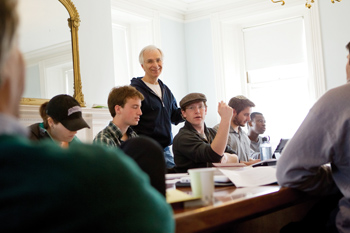By William Sweet
[Courses] How are we all going to die? There are so many options: killer tsunamis, mile-wide meteors, avian flu, earthquakes, dirty bombs. If you need a little distraction from this gloom, maybe it’s time to take in a movie. The Poseidon Adventure? Armageddon? Melancholia?
Ours seems to be an age of permanent catastrophe, with our time split between suffering disaster, worrying about it, making plans to minimize it and arguing over why it happened.

“The Meaning of Catastrophe” is an interdisciplinary seminar that aims to make sense of calamity. Not one but two “masters of disaster” lead students through this catalog of woe: Austin Sarat, the William Nelson Cromwell Professor of Jurisprudence and Political Science, and Lawrence Douglas, the James J. Grosfeld Professor of Law, Jurisprudence and Social Thought (and author of the novel The Catastrophist).
The course treats catastrophe as a sudden disruption of the existing normative order of a community. Douglas draws a distinction between this and tragedy, which carries the ancient Greek understanding of catharsis, and apocalypse, a Christian vision of a final disaster cleansing the world of sin.

The course starts not with Newtown or Jonestown but with the Book of Job, the biblical story of one man’s apparently monumental—and inexplicable—suffering. The professors move from Job’s misfortunes to those of Oedipus, who accepts his punishment, and then onward through philosophy, literature and history.
“Anyone who has read Hobbes’ Leviathan understands how the catastrophic is central to the constitution of the liberal legal and political order,” Sarat says. “But there is a more contemporary way of describing it, which is to think about the United States post-9/11, and the growth of the idea of a permanent state of emergency or the growth of the idea of ‘preparedness.’”

In the course, students question their assumptions about the ways in which communities are held together. “Professor Douglas is more of a lecturer; he has a very charismatic style,” says Heather Richard ’13. “Professor Sarat has more of a Socratic method, calling on students and having them lead the discussion. They’re possibly my two favorite professors at Amherst.”